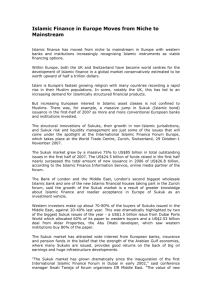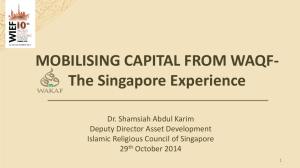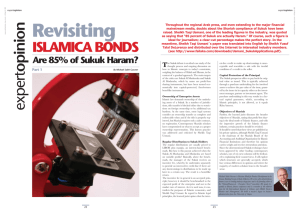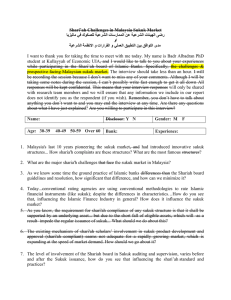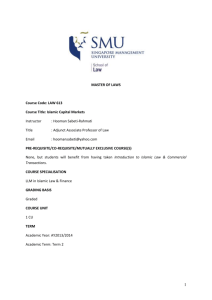Wan Abdul Rahim Kamil ICM Consultant, Securities Commission Malaysia ;
advertisement
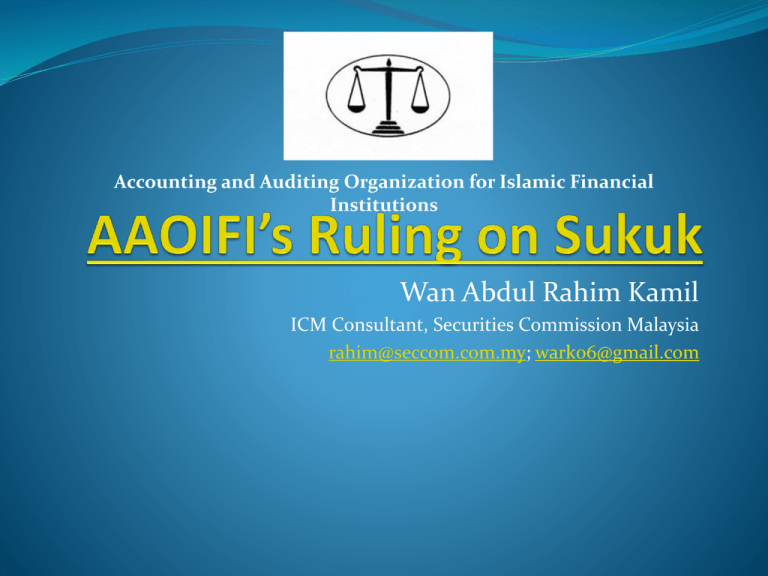
Accounting and Auditing Organization for Islamic Financial
Institutions
Wan Abdul Rahim Kamil
ICM Consultant, Securities Commission Malaysia
rahim@seccom.com.my; wark06@gmail.com
Accounting and Auditing Organization for Islamic Financial Institutions
(AAOIFI)
بسم هللا الرحمن الرحيم
In the name of Allah, the Beneficent, the Merciful
Praise be to Allah, and peace and blessings on His Noble Prophet and
on his family and Companions
As to what follows:
The Shari'ah Board of the Accounting and Auditing Organization for Islamic Financial
Institutions (AAOIFI), in view of the increased use of Sukuk worldwide, the public interest
in them, and the observations and questions raised about them, studied the subject of the
issuance of Sukuk in three sessions; first, in al-Madinah al-Munawwarah, on 12 Jumada
al-Akhirah 1428 AH (27 June, 2007), second, in Makkah al-Mukarramah, on 26 Sh'aban
1428 AH (8 September, 2007), and third
in the Kingdom of Bahrain on 7 and 8 Safar 1429AH (13 and 14 February, 2008).
Following the meeting of the working group, appointed by the Board, which met in Bahrain,
on 6 Muharram 1429AH (15 January, 2007), which was also attended by a significant
number of representatives from various Islamic banks and financial institutions, the
working group presented its report to the Shari'ah Board.
After taking into consideration the deliberations in these meetings and reviewing the
papers and studies presented therein, the Shari'ah Board - while re-affirming the rules
provided in the AAOIFI Shari'ah Standards concerning Sukuk - advises Islamic financial
institutions and Shari'ah Supervisory Boards to adhere to the following matters when
issuing Sukuk:
1. First: Sukuk, to be tradable, must be owned by Sukuk holders, with all rights and obligations of
ownership, in real assets, whether tangible, usufructs or services, capable of being owned and sold
legally …….. The Manager issuing Sukuk must certify the transfer of ownership of such assets in its
(Sukuk) books, and must not keep them as his own assets.
Second: Sukuk, to be tradable, must not represent receivables or debts, except in the case of a
trading or financial entity selling all its assets, or a portfolio with a standing financial obligation, in
which some debts, incidental to physical assets or usufruct, were included unintentionally,
Third: It is not permissible for the Manager of Sukuk, whether the manager acts as Mudharib
(investment manager), or Sharik (partner), or Wakil (agent) for investment, to undertake to offer
loans to Sukuk holders, when actual earnings fall short of expected earnings. It is permissible,
however, to establish a reserve account for the purpose of covering such shortfalls to the extent
possible
Fourth: It is not permissible for the Mudharib (investment manager), sharik (partner), or wakil
(agent) to undertake {now} to re-purchase the assets from Sukuk holders or from one who holds
them, for its nominal value, when the Sukuk are extinguished, at the end of its maturity. It is,
however, permissible to undertake the purchase on the basis of the net value of assets, its market
value, fair value or a price to be agreed, at the time of their actual purchase ……. In case the assets of
Sukuk of al-Musharakah, Mudharabah, or Wakalah for investment are of lesser value than the leased
assets of "Lease to Own" contracts (Ijarah Muntahiah Bittamlik), then it is permissible for the Sukuk
manager to undertake to purchase those assets - at the time the Sukuk are extinguished - for the
remaining rental value of the remaining assets; since it actually represents its net value.
Fifth: It is permissible for a lessee in a Sukuk al-Ijarah to undertake to purchase the leased assets
when the Sukuk are extinguished for its nominal value, provided he {lessee} is not also a partner,
Mudharib, or investment agent.
Summary of opinion on Sukuk as discussed
during a recent AAOIFI Shari’ah Board.
New Sukuk should be issued on the basis of new commercial or industrial projects.
However, if these are issued on the basis of an existing project, then it is necessary that
the Sukuk represent full ownership of the Sukuk holders in genuine assets that can be
owned and traded in, no matter whether they are tangible assets or usufruct or
intellectual rights.
SALE OF RECEIVABLES:
If the Sukuk represent the receivables only and not the assets, then it is not
permissible to issue such Sukuk or to participate in them.
TRUE SALE:
If the Sukuk represent the shares of companies it is necessary that they are registered
in the name of Sukuk holders or their representative and should not represent
beneficial ownership only.
Other assets underlying the Sukuk must be registered in the name of Sukuk holders or
their representative, and if it is not possible for some reason, it is necessary that a
counter-deed recognizable in law should be signed so that all the risks and rewards are
transferred to the Sukuk holders or their representative.
SALE WITH CONDITIONAL LEASE OR CONDITIONAL REPURCHASE. REPURCHASE
MUST BE BY WAY OF PROMISE OR WA’AD:
It is not permissible that the assets are transferred to Sukuk holders or their
representative on the condition that they will lease them back to the transferor nor is
it permissible that the transfer is conditional with a promise from the lessee to
purchase it. However, the transferor may take the assets on lease as separate from
sale.
The sale of debts of Murabahah is not permissible. However, it may be permissible only
if a commercial entity sells all its assets, or the assets of an already existing portfolio that
has an independent financial entity, or if the commercial entity sells the proportionate
part of its assets. In these three cases the debts of Murabahah may be taken as a minor
part of the whole business consisting of tangible assets and usufruct. In all these cases
AAOIFI Shari'ah Standard No.21 concerning financial papers must be complied with.
The proceeds of the project must be distributed between the Sukuk holders without any
ceiling but after deducting the expenses including fees of the Manager or the profit of
Mudharib. If an incentive is intended to be given to the Manager or the Mudharib, then
it should be on the basis of an expected return of the project, in the sense that if the
actual profit exceeds the expected profit rate according to the feasibility report, then the
excess may be given to him. The incentive should not be based on the interest rate.
If there is a periodic distribution on the basis of an indicator, it should be taken as ‘on
account’ payment which will be subject to final settlement at the time of maturity of
Sukuk, and if in this case the actual profit exceeds the indicator it should be wholly or
partly kept as a result for periodic distribution and to hedge against the loss.
If the Manager of the assets of the Sukuk is a Mudharib or a Shareek or a Management
Agent vis-à-vis the Sukuk holder, then it is not permissible that he extends a loan to the
Sukuk holder in case of a shortfall from the expected profit. Instead, the shortfall may be
made up by the reserve mentioned in No.8 above, if any. Or it may acquire an Islamic
financing from a third party at the cost of Sukuk holders with condition that it should be
expressly mentioned in the prospectus.
PURCHASE UNDERTAKING ALLOWED ONLY FOR IJARAH CONTRACTS. FOR NONIJARAH THEY MUST BE AT MARKET VALUE, FAIR PRICE OR AT AGREED PRICE AT
TIME OF PURCHASE
AAOIFI Shari'ah Board has confirmed the rulings given in AAOIFI Shari'ah Standard
No.12, clause 3.1.6.2 and Standard No.5, clause 2.2.1 and 2.2.2 that it is not permissible
for Mudharib or Shareek or an Investment Agent to undertake that he will purchase
the assets of the Sukuk at their face value, rather an undertaking to purchase must be
on the basis of net assets value or at a price that may be agreed upon at the time of
purchase, and not at the time of issuing the Sukuk.


